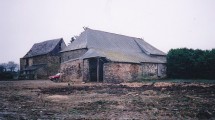We started looking north-east in the area known as Haute Anjou. The countryside was beautiful; the Romans and Napoleon had left long straight stretches of poplar-lined roads, at times there were very few cars and the Loire River was 20-30 minutes away.
 Bernard Juby and wife Pamela were keen to find a holiday home near their family in France
Bernard Juby and wife Pamela were keen to find a holiday home near their family in France
The immobiliére (estate agent) was a Spaniard who was the worst driver we’d ever met, with the habit of continually turning round to talk to us. We survived this ordeal on several visits to various houses spread over several trips, during which we must have kept Brittany Ferries in business.
Eventually we were redirected to the fortified market town of Pouancé, strategically situated on the river Versée on the old French-Brittany border with a castle built to keep the invading Bretons and English out.
• The miserable lot of an estate agent in France
• French banks ask expats for cash to get best mortgages
During these visits we often passed through the small, pretty, riverside village of Armaillé. On a miserable rainy day after seeing some houses, many empty and some with less than welcoming tenants, we were on our way home when the agent said: “We’ll just call in here. The tenant farmer has retired and the family want to sell it. It’s just come on the market.”
We drove into the courtyard and, because of the weather, my wife stayed in the car. The building was surrounded by a sea of mud where the farmer had recently taken down some cow sheds before moving out. Once inside it was a mass of exposed beams and looked very old. Many of the window frames were stone-lined and there was a very old dressed stone doorway. I asked to see the roof and was shown a ladder up against a hole in the ceiling of the room where the farmer had milked his cows (pictured below).

At the top I looked through and couldn’t believe my eyes. As far as the eye could see were terre cuit (clay-baked quarry tiles) covering an area the size of a tennis court while the exposed beams with their wooden pegs were all original. I rushed out and said to Pamela, “You have just got to see this!”
She thought: “If he likes it that much, then we’d better take it.”
The next day we went down to the local town hall and asked the mayor about any proposed planned building work nearby. He was rather astonished by the question and told us that the entire area was designated as only agricultural but was delighted to learn that when I had fully retired we would live there permanently.
And so it was that over 15 years ago we came to buy our pile of stones in a sea of mud. It turned out (from deeds in the National Archives in Angers) that it had been built around 1545. The barn across the courtyard, with its wattle and daub dividing walls, had been built at an even earlier date. The house is shown by name on the very earliest maps of the area.
There were also human bones discovered in the courtyard – victims of the peste noir (Black Death) who had been buried on the spot. This is perhaps another story for another time.
My tips for buying in France:
• There is a glut of houses currently on the market over here so prices are low. The strength of the pound against the euro means that there are some excellent bargains to be had.
• Remember when choosing a location, go for areas where there is easy access by road, plane or ferry. Some cheap airlines are in the habit of no longer flying into airports when they lose their cheaper tax concessions so don’t get stuck with a listing that is no longer serviced by the local airport.
• The south of France can experience storms and severe flooding so think about the excellent climate just north of the Loire up towards the Mayenne area.
• Although we were relatively out in the countryside, the local market town was just six kilometres away so handy for the shops, post office, doctor, chemist and the DIY store. Keep basic amenities in mind when picking an area.
• Do try to integrate with the neighbours – even if you don’t speak French very well. Invite them in for a drink and you will find that trying a few words will break the ice and they are often eager to speak what English they have learnt.
• Many villages run what is called a covoiturage scheme where volunteers arrange a rota for when they are available to ferry fellow members around. You pay the driver an agreed sum per kilometre.
• If you are thinking of buying your own “pile of stones in a sea of mud” then take the plunge. The land is so fertile that if you stuck your thumb in the ground it would take root so the mud soon turns to green and the stones are very mellow in the sunshine.
Dr Bernard Juby is a retired medical practitioner who, together with wife Pamela, a former nursing sister, lives in the Haut Anjou region of Maine et Loire

